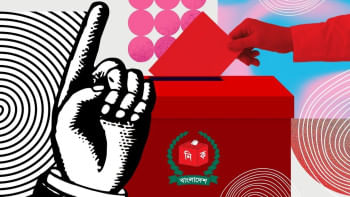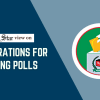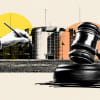The return of ‘No Vote’ option is long overdue

With the country set on the path to a national election in February, the Election Commission has reportedly proposed major changes in the draft Representation of the People Order (Amendment) Ordinance, 2025, including a "No Vote" option to prevent uncontested elections. As per the draft, if only one candidate remains following the process of scrutiny or withdrawal of candidature, that candidate will have to "contest" against a No Vote option in their constituency. Should No Vote receive more ballots than the candidate, a fresh election schedule will be announced, but if the candidate secures more votes, they will be declared elected.
It may be recalled that the No Vote provision, first introduced ahead of the 2008 election, was scrapped shortly after Awami League came to power in early 2009. On the surface, its likely reintroduction may seem technical or procedural, reflecting the changing times that we are in. In truth, it speaks to something greater—the power of refusal in democracy. Few words are as short yet as powerful as no. It is the word of protest, of resistance, of freedom. Jean-Paul Sartre saw in negation the essence of human choice, while Friedrich Hegel treated it as the motor of history. To say no is not merely to refuse. It is to claim space, to open the door to change.
Bangladesh's own history shows the power of refusal. In fact, the nation was born out of a collective no—no to cultural erasure, no to economic exploitation, no to the theft of a democratic mandate in 1970. At every turning point in our political history, progress has come not from passive acceptance but from active rejection of what was unjust. To deny that right, inside the voting booth no less, would be a betrayal to that democratic spirit.
Unfortunately, elections in our country have often left citizens without choice. Voters are asked to choose among candidates imposed by political parties that often nominate them for reasons other than public service. Voter abstention is also seen as apathy, and spoiled ballots as mischief. But the real problem here is not the voters'; it is that of the parties who are unwilling to honour the public's demand for something better.
The No Vote option gives dissenting voters a voice. It turns frustration into a measurable verdict. A citizen who marks No Vote is not abandoning democracy but affirming it. They are saying: we believe in this system, but we do not accept these choices. It is a demand for politics worthy of the people it seeks to represent.
Critics argue that No Vote could be symbolic. After all, the leading candidate still wins. But politics has never been about arithmetic alone. It runs on legitimacy, on the perception that leaders truly embody the people's will. Imagine an election where a quarter of ballots are cast for No Vote. Could any winner then stand before the nation and claim with confidence to speak for the majority? Such a result would be a referendum within the election itself, a mirror held up to a political culture that has too often relied on inertia and entitlement.
Symbols matter because they shape action. A flag is only cloth, yet it can unite a nation. A slogan is only words, yet it can unseat a regime. In the same way, No Vote can unsettle complacency. A significant rejection on the ballot could force parties to rethink how they select candidates, how they write manifestos, and how they connect with citizens. It could remind them that consent must be earned, not assumed.
At its heart, No Vote is also about dignity. Voting is not merely an act of choice but a declaration of identity. Without the option of refusal, that identity is incomplete. A ballot without No Vote is not a conversation between the rulers and the ruled but a monologue imposed from above. To restore it is to affirm that citizens are sovereign, not ornamental. This recognition is particularly urgent in Bangladesh where voter dignity has too often been compromised. Violence at polling stations, boycotted contests, and doubts about neutrality have frequently eroded public trust. Restoring No Vote will not solve these structural flaws, but it will reassert that dissent counts as much as consent.
The general public mood as represented in several recent surveys shows a sense of uncertainty, even scepticism, about our democratic transition. Nearly half the respondents in one survey said they were undecided about whom to support in the upcoming polls. These citizens are not indifferent; they are waiting, weighing, searching. For them, No Vote provides a way to remain engaged without pretending that poor choices are acceptable. To ignore this right of refusal is to invite cynicism. Dissent can be debated, engaged, even persuaded. Cynicism cannot. The greatest danger to Bangladesh's democracy is not too much argument but too little faith. No Vote offers a way to bring the disillusioned back into the democratic fold, to let them express dissatisfaction without abandoning the process itself.
The Election Commission's broader reform package is not insignificant. Abolishing the provision for electronic voting machines (EVMs), expanding the definition of law enforcement agencies to include the armed forces, and expanding the commission's authority are all crucial measures. But none carries the moral and symbolic weight of reviving the No Vote. To say no to the available candidates is not to disrupt the electoral process, but to demand better candidates. It is to insist that another politics is possible.
Kazi ASM Nurul Huda is associate professor of philosophy at the University of Dhaka, and the Cmelikova Visiting International Scholar in Leadership and Ethics at the University of Richmond. He can be reached at [email protected].
Views expressed in this article are the author's own.
Follow The Daily Star Opinion on Facebook for the latest opinions, commentaries and analyses by experts and professionals. To contribute your article or letter to The Daily Star Opinion, see our guidelines for submission.

 For all latest news, follow The Daily Star's Google News channel.
For all latest news, follow The Daily Star's Google News channel. 










Comments